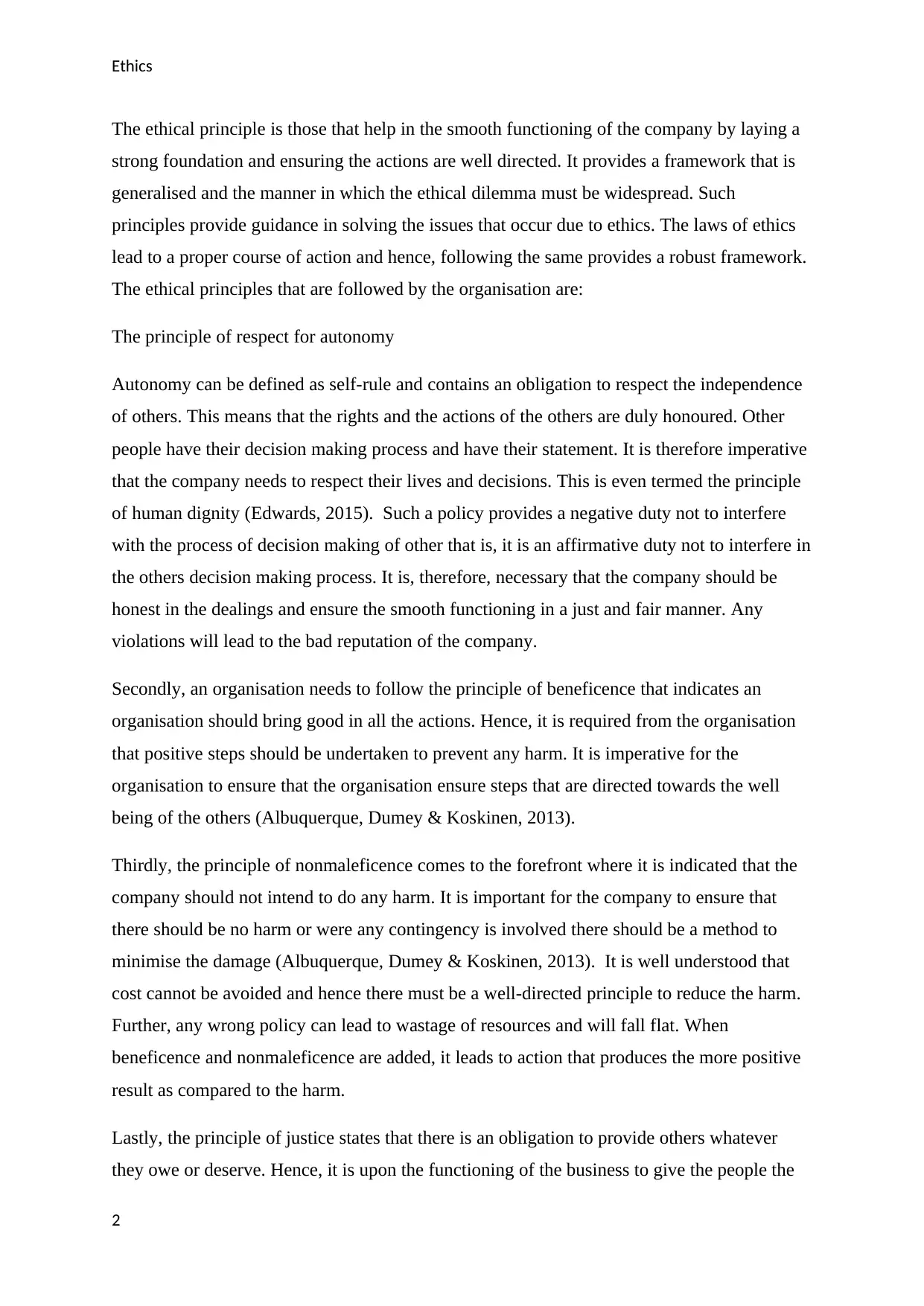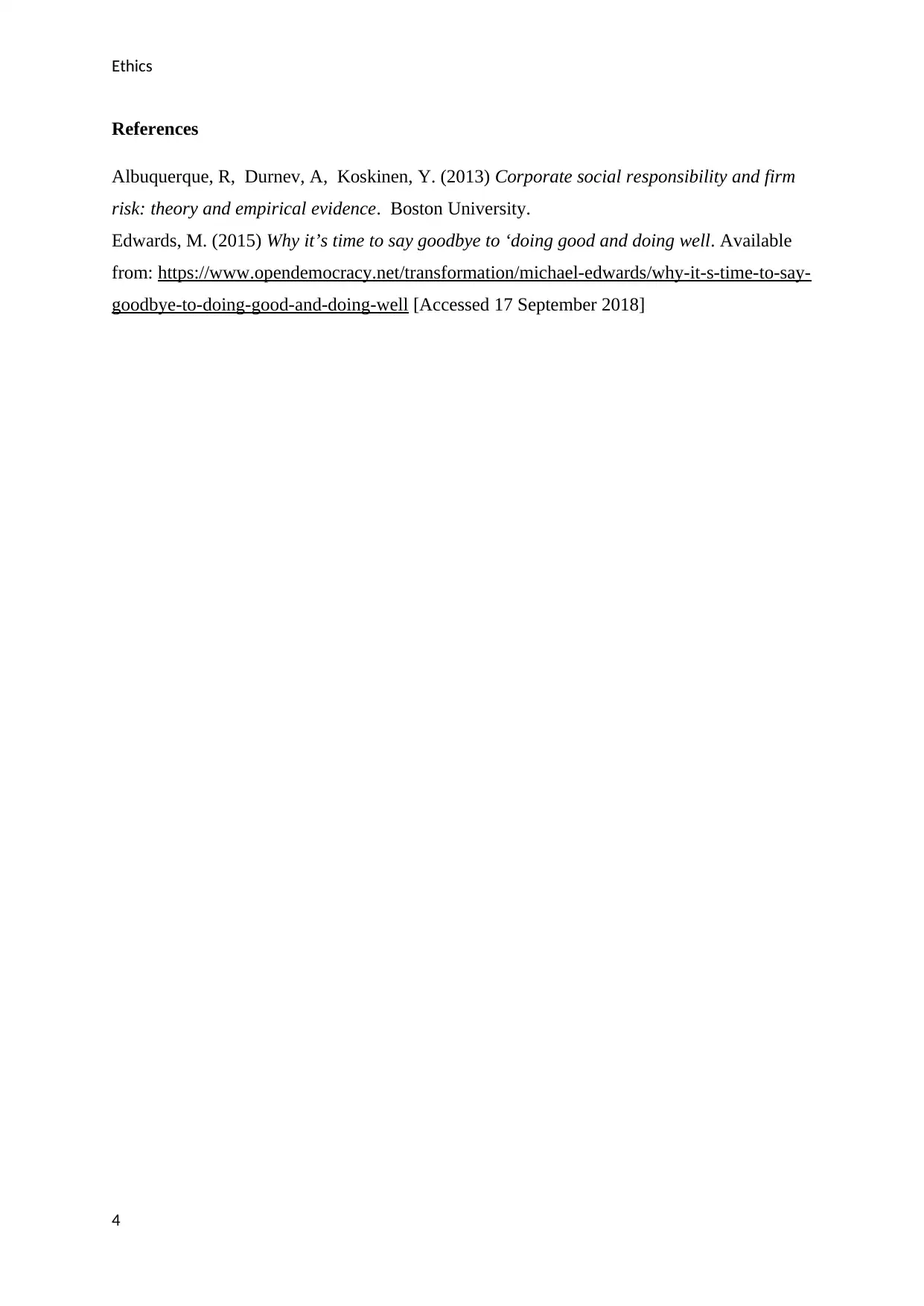Financial Accounting Ethics: BHP Billiton Mining Deal Case Study
VerifiedAdded on 2023/06/04
|4
|642
|223
Case Study
AI Summary
This case study examines the ethical principles involved in financial accounting, using the BHP Billiton mining deal in Cambodia as a central example. It highlights the importance of respecting autonomy, acting with beneficence and nonmaleficence, and ensuring justice in business dealings. The case study outlines how alleged corruption and unethical practices, such as 'tea money' payments, can lead to investigations and damage a company's reputation. The study emphasizes the need for organizations to adhere to ethical guidelines to maintain integrity and avoid negative consequences, referencing the importance of honoring others' decisions, promoting well-being, minimizing harm, and providing deserved benefits.

qwertyuiopasdfghjklzxcvbnmqwertyui
opasdfghjklzxcvbnmqwertyuiopasdfgh
jklzxcvbnmqwertyuiopasdfghjklzxcvb
nmqwertyuiopasdfghjklzxcvbnmqwer
tyuiopasdfghjklzxcvbnmqwertyuiopas
dfghjklzxcvbnmqwertyuiopasdfghjklzx
cvbnmqwertyuiopasdfghjklzxcvbnmq
wertyuiopasdfghjklzxcvbnmqwertyuio
pasdfghjklzxcvbnmqwertyuiopasdfghj
klzxcvbnmqwertyuiopasdfghjklzxcvbn
mqwertyuiopasdfghjklzxcvbnmqwerty
uiopasdfghjklzxcvbnmqwertyuiopasdf
ghjklzxcvbnmqwertyuiopasdfghjklzxc
vbnmqwertyuiopasdfghjklzxcvbnmrty
uiopasdfghjklzxcvbnmqwertyuiopasdf
ghjklzxcvbnmqwertyuiopasdfghjklzxc
vbnmqwertyuiopasdfghjklzxcvbnmqw
FINANCIAL ACCOUNTING
opasdfghjklzxcvbnmqwertyuiopasdfgh
jklzxcvbnmqwertyuiopasdfghjklzxcvb
nmqwertyuiopasdfghjklzxcvbnmqwer
tyuiopasdfghjklzxcvbnmqwertyuiopas
dfghjklzxcvbnmqwertyuiopasdfghjklzx
cvbnmqwertyuiopasdfghjklzxcvbnmq
wertyuiopasdfghjklzxcvbnmqwertyuio
pasdfghjklzxcvbnmqwertyuiopasdfghj
klzxcvbnmqwertyuiopasdfghjklzxcvbn
mqwertyuiopasdfghjklzxcvbnmqwerty
uiopasdfghjklzxcvbnmqwertyuiopasdf
ghjklzxcvbnmqwertyuiopasdfghjklzxc
vbnmqwertyuiopasdfghjklzxcvbnmrty
uiopasdfghjklzxcvbnmqwertyuiopasdf
ghjklzxcvbnmqwertyuiopasdfghjklzxc
vbnmqwertyuiopasdfghjklzxcvbnmqw
FINANCIAL ACCOUNTING
Paraphrase This Document
Need a fresh take? Get an instant paraphrase of this document with our AI Paraphraser

Ethics
The ethical principle is those that help in the smooth functioning of the company by laying a
strong foundation and ensuring the actions are well directed. It provides a framework that is
generalised and the manner in which the ethical dilemma must be widespread. Such
principles provide guidance in solving the issues that occur due to ethics. The laws of ethics
lead to a proper course of action and hence, following the same provides a robust framework.
The ethical principles that are followed by the organisation are:
The principle of respect for autonomy
Autonomy can be defined as self-rule and contains an obligation to respect the independence
of others. This means that the rights and the actions of the others are duly honoured. Other
people have their decision making process and have their statement. It is therefore imperative
that the company needs to respect their lives and decisions. This is even termed the principle
of human dignity (Edwards, 2015). Such a policy provides a negative duty not to interfere
with the process of decision making of other that is, it is an affirmative duty not to interfere in
the others decision making process. It is, therefore, necessary that the company should be
honest in the dealings and ensure the smooth functioning in a just and fair manner. Any
violations will lead to the bad reputation of the company.
Secondly, an organisation needs to follow the principle of beneficence that indicates an
organisation should bring good in all the actions. Hence, it is required from the organisation
that positive steps should be undertaken to prevent any harm. It is imperative for the
organisation to ensure that the organisation ensure steps that are directed towards the well
being of the others (Albuquerque, Dumey & Koskinen, 2013).
Thirdly, the principle of nonmaleficence comes to the forefront where it is indicated that the
company should not intend to do any harm. It is important for the company to ensure that
there should be no harm or were any contingency is involved there should be a method to
minimise the damage (Albuquerque, Dumey & Koskinen, 2013). It is well understood that
cost cannot be avoided and hence there must be a well-directed principle to reduce the harm.
Further, any wrong policy can lead to wastage of resources and will fall flat. When
beneficence and nonmaleficence are added, it leads to action that produces the more positive
result as compared to the harm.
Lastly, the principle of justice states that there is an obligation to provide others whatever
they owe or deserve. Hence, it is upon the functioning of the business to give the people the
2
The ethical principle is those that help in the smooth functioning of the company by laying a
strong foundation and ensuring the actions are well directed. It provides a framework that is
generalised and the manner in which the ethical dilemma must be widespread. Such
principles provide guidance in solving the issues that occur due to ethics. The laws of ethics
lead to a proper course of action and hence, following the same provides a robust framework.
The ethical principles that are followed by the organisation are:
The principle of respect for autonomy
Autonomy can be defined as self-rule and contains an obligation to respect the independence
of others. This means that the rights and the actions of the others are duly honoured. Other
people have their decision making process and have their statement. It is therefore imperative
that the company needs to respect their lives and decisions. This is even termed the principle
of human dignity (Edwards, 2015). Such a policy provides a negative duty not to interfere
with the process of decision making of other that is, it is an affirmative duty not to interfere in
the others decision making process. It is, therefore, necessary that the company should be
honest in the dealings and ensure the smooth functioning in a just and fair manner. Any
violations will lead to the bad reputation of the company.
Secondly, an organisation needs to follow the principle of beneficence that indicates an
organisation should bring good in all the actions. Hence, it is required from the organisation
that positive steps should be undertaken to prevent any harm. It is imperative for the
organisation to ensure that the organisation ensure steps that are directed towards the well
being of the others (Albuquerque, Dumey & Koskinen, 2013).
Thirdly, the principle of nonmaleficence comes to the forefront where it is indicated that the
company should not intend to do any harm. It is important for the company to ensure that
there should be no harm or were any contingency is involved there should be a method to
minimise the damage (Albuquerque, Dumey & Koskinen, 2013). It is well understood that
cost cannot be avoided and hence there must be a well-directed principle to reduce the harm.
Further, any wrong policy can lead to wastage of resources and will fall flat. When
beneficence and nonmaleficence are added, it leads to action that produces the more positive
result as compared to the harm.
Lastly, the principle of justice states that there is an obligation to provide others whatever
they owe or deserve. Hence, it is upon the functioning of the business to give the people the
2

Ethics
benefits they deserve. Accordingly, the organisation should not act in a manner that will lead
to the unfair burden. Imposing undue burden will lead to negative publicity for the company
and in turn will destroy the goodwill (Edwards, 2015). Hence, the company should follow the
principle that is best directed at bringing the good and passing the benefits.
3
benefits they deserve. Accordingly, the organisation should not act in a manner that will lead
to the unfair burden. Imposing undue burden will lead to negative publicity for the company
and in turn will destroy the goodwill (Edwards, 2015). Hence, the company should follow the
principle that is best directed at bringing the good and passing the benefits.
3
⊘ This is a preview!⊘
Do you want full access?
Subscribe today to unlock all pages.

Trusted by 1+ million students worldwide

Ethics
References
Albuquerque, R, Durnev, A, Koskinen, Y. (2013) Corporate social responsibility and firm
risk: theory and empirical evidence. Boston University.
Edwards, M. (2015) Why it’s time to say goodbye to ‘doing good and doing well. Available
from: https://www.opendemocracy.net/transformation/michael-edwards/why-it-s-time-to-say-
goodbye-to-doing-good-and-doing-well [Accessed 17 September 2018]
4
References
Albuquerque, R, Durnev, A, Koskinen, Y. (2013) Corporate social responsibility and firm
risk: theory and empirical evidence. Boston University.
Edwards, M. (2015) Why it’s time to say goodbye to ‘doing good and doing well. Available
from: https://www.opendemocracy.net/transformation/michael-edwards/why-it-s-time-to-say-
goodbye-to-doing-good-and-doing-well [Accessed 17 September 2018]
4
1 out of 4
Related Documents
Your All-in-One AI-Powered Toolkit for Academic Success.
+13062052269
info@desklib.com
Available 24*7 on WhatsApp / Email
![[object Object]](/_next/static/media/star-bottom.7253800d.svg)
Unlock your academic potential
Copyright © 2020–2025 A2Z Services. All Rights Reserved. Developed and managed by ZUCOL.





